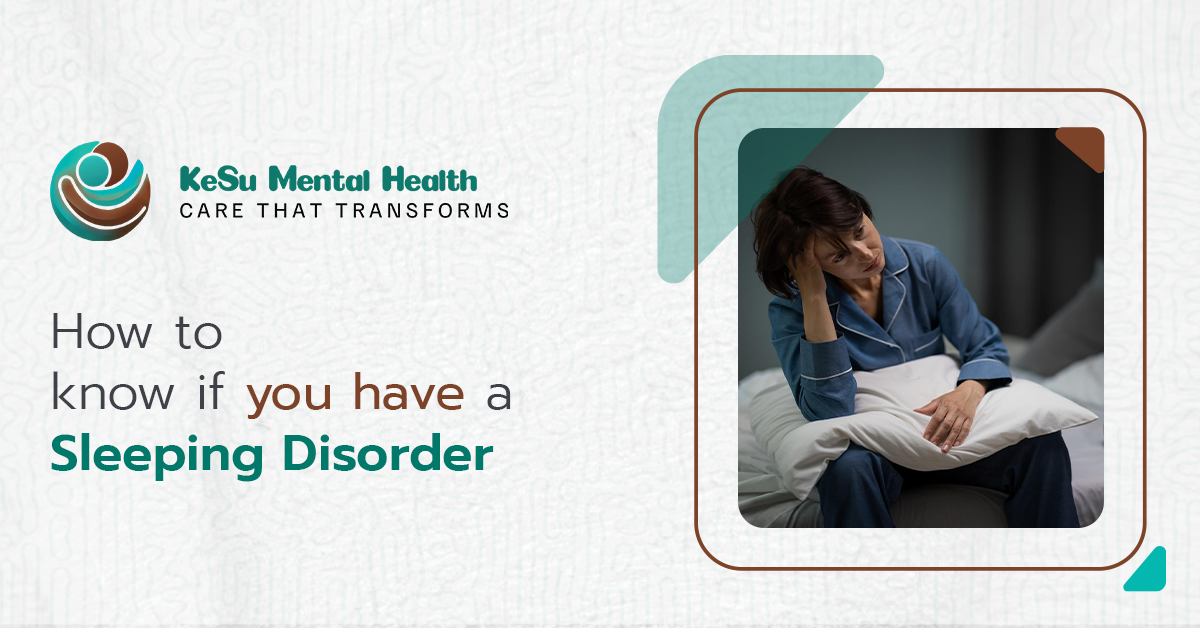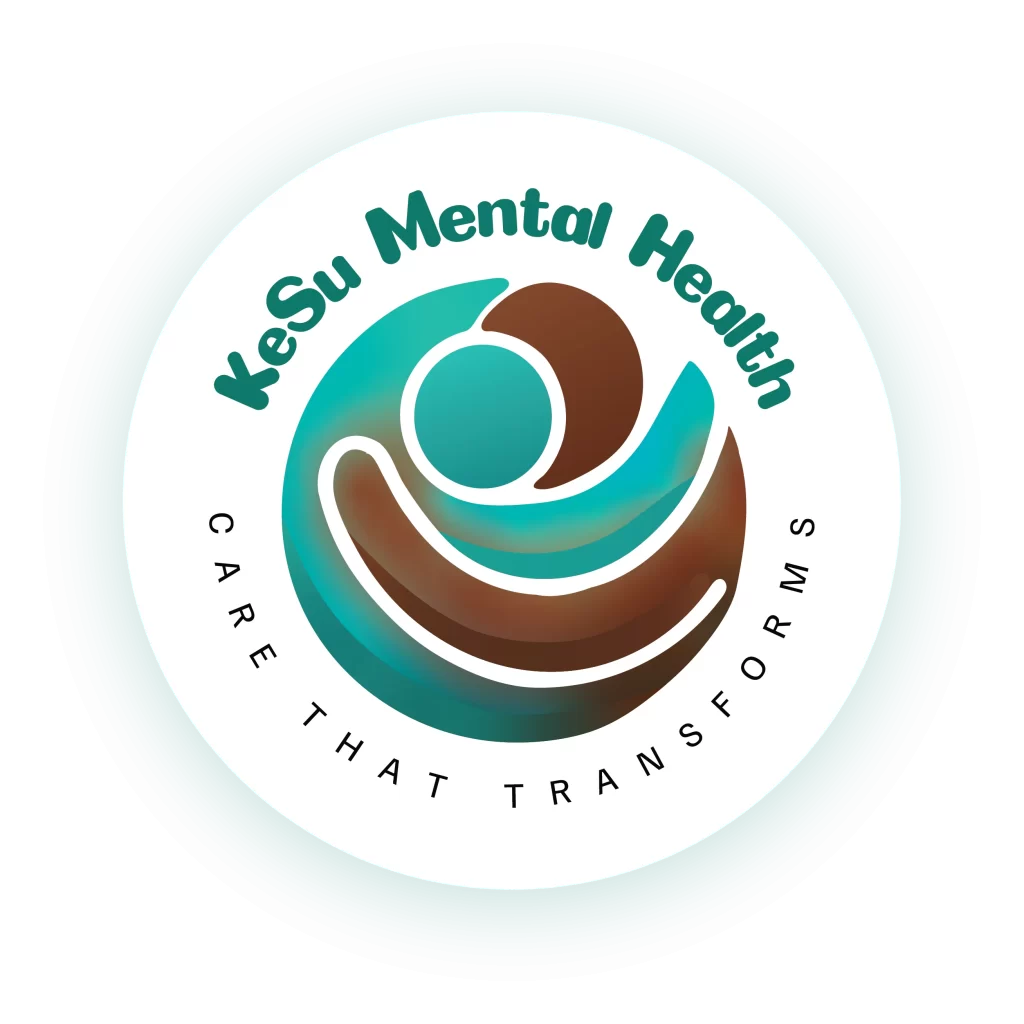Having enough sleep is necessary for optimal health. But what if you struggle to sleep well at night? Many people experience sleep issues, but some may have an actual sleeping disorder.
So, how to know if you have a sleeping disorder?
In this blog, we will explore the signs of sleep disorders, different types, and what to do next.
Sleep disturbances like insomnia, sleep apnea, and nightmares can affect your entire life. At KeSu Mental Health, we’ll identify causes and develop a plan to restore healthy sleep. Contact us.
Understand Sleep Disorder
A sleep disorder is a condition where you find it hard to get enough rest. It can interrupt your sleep in several ways:
- You might experience trouble dozing off.
- You may find yourself up at night and struggling to doze off once more.
- You may not feel refreshed when you get up.
Sleep disorders include all of the following except normal tiredness from a busy day. Doctors and the Centre for Sleep Disorders should be consulted if sleep disruptions frequently impact everyday life.
How to Know If You Have a Sleeping Disorder?
Pay attention to these familiar signs:
- Issues with dozing off or maintaining sleep
- Waking up too early and struggling to return to sleep
- Experiencing complete exhaustion or moderate fatigue continuously.
- Noisy snores or breathless moments at night
- Lack of focus due to poor sleep quality
- Frequent morning headaches
- Increased irritability, mood swings, or depression
- Restless leg actions overnight
- Unusual sleep behaviors, such as texting in sleep
If you experience these symptoms often, a sleep disorder test can help identify the cause.
Types of Sleep Disorders
Several types of sleep disorders affect people differently:
- Sleep Apnea
Sleep apnea is the situation in which breathing stops and starts during sleep. Sleep apnea can be preceded by loud snoring and physical fatigue during the day.
Ignoring the proper way of treating sleep apnea will lead to a sudden change in health conditions.
Other sleep apnea alternatives besides surgeries are weight loss, breathing machines, and lifestyle changes.
- Insomnia
Insomnia is trouble either falling asleep or staying asleep. It can be temporary or permanent. The difference between insomnia and apnea is that insomnia affects your sleep. Apnea causes you to stop breathing during sleep.
- Narcolepsy
The condition of narcolepsy makes patients experience uncontrollable and fast sleep episodes throughout their daytime hours. Daily performance of tasks may become fatal for people suffering from this condition.
People with narcolepsy sometimes submit narcolepsy disability benefit applications because of their condition.
- Restless Leg Syndrome (RLS)
RLS causes restlessness in the legs, making it hard to relax. Moving the legs represents one of the steps in treating this condition.
- Sleep Deprivation Psychosis
A profound lack of sleep can often lead to sleep deprivation psychosis. Signs and symptoms of it may be delusions and hallucinations, disorientation, and impaired cognition.
Tests to Know If You Have a Sleeping Disorder
If you suspect a sleep disorder, these tests can help:
- Sleep Study (Polysomnography)
At the sleep disorder center, technicians repeatedly monitor a patient’s respiration, heart rate, and brain throughout the night.
- Home Sleep Apnea Test
It is a home-based version that looks at an individual’s breathing pattern to determine the presence of sleep apnea.
- Multiple Sleep Latency Test
The test determines when you must be tired in different situations to analyze excessive daytime sleepiness.
Visit a neurology and sleep disorders clinic for a diagnosis and treatment plan from sleep specialists.
What Does a Sleep Doctor Do?
During medical evaluations, a sleep specialist gives treatment advice and recommends medications, like:
- CPAP machines for sleep apnea
- Medications for insomnia and narcolepsy
- Behavioral therapy for sleep improvement
Teaming up with a sleep specialist can enhance your sleep and your health.
Signs You Need More Sleep
Sleep deficiency can cause major health problems. Warning signs you need to sleep include:
- Ongoing yawning and tiredness
- Struggling to remain alert throughout the day
- Poor concentration and memory issues
- Irritability and mood swings
A sleeping problems test can help determine if you need professional intervention.
How to Improve Your Sleep?
If you’re struggling to sleep, try these proper techniques:
- Regularly keep to your sleep schedule.
- Avoid caffeine, screens, and electronic items for hours before rest.
- Put on soothing sleep music to calm yourself before going to bed.
- Use the best eye mask for sleeping to block out light.
- Build a silent and cozy sleep environment.
- Engage in physical activity but skip it right before sleep.
When to See a Doctor?
If sleep problems persist, medical attention may be necessary. Consult a doctor if you experience:
- Falling asleep while driving or working
- Waking up gasping for air
- Numbness in arms or legs during sleep
- Difficulty remembering things or feeling confused
- Unusual sleep behaviors like texting in sleep
Conclusion
Sleep disturbances can impact your whole life, but doctors can treat them effectively.
If you’re in doubt about how to know if you have a sleeping disorder, notice common signs.
A nap examination or visiting a sleep clinic might be the initial move to the physician’s office.
Consulting a physician is essential, one can notice the benefits in one’s life by practicing sleep hygiene. That way, they will enjoy better health.
FAQs
Q: Does anxiety cause sleep apnea?
The leading cause of sleep apnea is not anxiety. However, anxiety can make the symptoms worse. Nighttime restlessness often increases because of these factors. Sleep breathing patterns also suffer adverse effects.
Q: Why do my arms go to sleep in bed?
The reasons behind this are when your circulation is inadequate, nerves are compressed, or you have carpal tunnel syndrome and neuropathy. These are also common causes of that phenomenon.
Q: What is the treatment for sleep deprivation psychosis?
Treatment for sleep deprivation psychosis includes:
- Fast sleep recovery
- Cognitive therapy
- Hospital admission or prescribing drugs in serious cases
Q: What is a nursing care plan for sleeping pattern disturbance?
A care plan for sleep disturbances includes these key components:
- Assessing sleep habits
- Implementing relaxation techniques
- Adjusting medications
- Monitoring for underlying health conditions



No comment